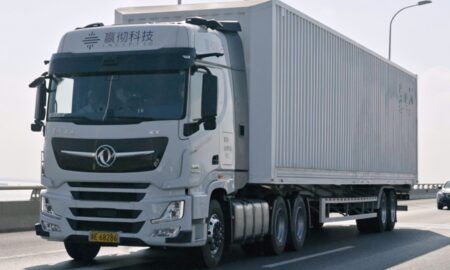Following the signing of Michigan’s SAVE Act legislation to support automated vehicle testing and deployment in the state, General Motors (GM) has announced that it will immediately begin testing autonomous vehicles on public roads.
As well as the start of its public testing program, GM also announced that it will produce the next generation of its autonomous test vehicles at its Orion Township assembly plant, beginning in early 2017. Testing is already underway on GM’s Technical Center campus in Warren, Michigan (below), and with the passage of the SAVE Act legislation the company will now expand the testing program to public roads on the facility’s outskirts. Within the next few months, testing will further expand to the metropolitan Detroit area, which will become GM’s main location for development of autonomous technology in winter climates.
Last week, Michigan Governor Rick Snyder, passed into law State Bills 995, 996, 997, and 998, which collectively form the SAVE Act legislation. The new laws allow the testing and general operation of vehicles without steering wheels, pedals, or needed human control. The Act has several clear distinctions from other state laws, which Michigan hopes will give it an advantage over other regions, such as California, Nevada and Florida, in the advance of driverless car development.
Workers at the Orion Township assembly plant will build GM’s test fleet of Chevrolet Bolt electric vehicles (EVs) equipped with fully autonomous technology, including lidar, cameras, sensors, and other hardware designed to ensure system safety. The plant currently manufactures the Bolt EV and gasoline-powered Sonic. The test fleet vehicles will be used by GM engineers for continued testing and validation of the company’s autonomous technology that is already underway on public roads in San Francisco, California, and Scottsdale, Arizona, as well as part of the Michigan testing fleet.
Since the beginning of 2016, GM has taken significant steps in its development of autonomous vehicle technology. In January, the company announced the formation of a dedicated autonomous vehicle engineering team and a US$500m investment in rideshare company Lyft to develop an integrated network of on-demand autonomous vehicles in the USA. In March, the company announced the acquisition of Cruise Automation to provide deep software talent and rapid development expertise to help speed development. In June, GM began testing autonomous Chevrolet Bolt EVs on the public roads in San Francisco and Scottsdale. The company has more than 40 autonomous vehicles testing in the two cities.
“Revolutionizing transportation for our customers, while improving safety on roads, is the goal of our autonomous vehicle technology, and today’s announcement gets us one step closer to making this vision a reality,” said GM’s chairman and CEO, Mary Barra. “Our autonomous technology will be reliable and safe, as customers have come to expect from any of our vehicles.”




